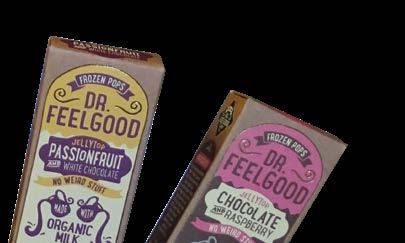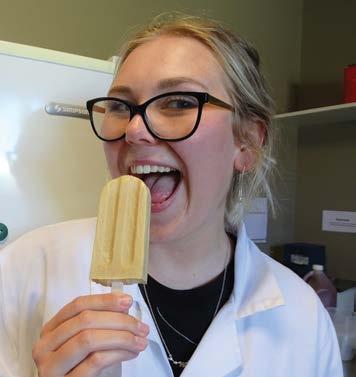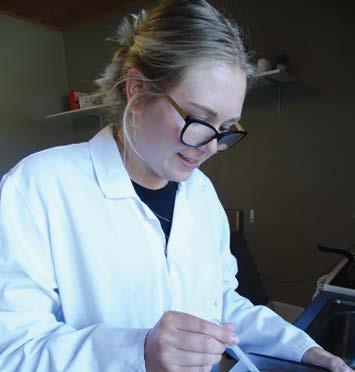
3 minute read
Looking at the future
Hannah’s task is to add a vegan choice to the range
For 10 weeks, food technology graduate Hannah Davis has the task of creating a vegan ice cream for Tasman Bay Food Company’s Dr Feelgood range.
YOUNG GROWERS
By Anne Hardie
It’s part of the government’s Callaghan Innovation programme that funds research and development internships for businesses to take on students during their summer break.
For Hannah, the ice cream project at the Brightwater-based business is the next step after completing a Bachelor of Food Technology (Hons) at Massey University, majoring in product development, before seeking a career centred around horticulture products. For the vegan ice cream, she’s hoping to include local boysenberries, as the company is keen on collaboration with local businesses. Organic coconut sugar is likely to feature and the end product will have completely compostable packaging that is quirky and appeals to its target market. For the past two summers Hannah worked for The Apple Press in Hawke’s Bay where she took up a year-long project to design equipment that could extend a product range. Designing equipment in the food industry and creating vegan ice cream shows the diversity in food technology and the possibilities ahead of her. She says the internships are a great way for budding food technologists to gain experience and an opportunity for businesses to glean fresh ideas from students for their research and development. She was one of just 12 Massey food technology graduates in her year because too few high school students know

much about it as a career. Yet she says the world needs more food technologists to meet future demand for not just food products, but also environmental aspects such as packaging. “Our generation is going to be the generation of change, in packaging, understanding food and what goes into food. There’s going to be a lot of change around additives and preservatives, health and wellness-based food in the future. We’re much more aware of what is going on in our food. “We’re picking locally-based products over cheaper products and our generation is prepared to pay a premium for our food. A lot of students are focused on keeping New Zealand going by buying locally.” Packaging is a huge issue going forward and Hannah says both consumers and food companies need to change. “Consumers need to become more aware of what biodegradable packaging means because currently most of it goes back into landfill. So they’re basically just spending more on cutting down trees to make biodegradable packaging. I think companies need to focus on single plastics rather than multiple plastics. There are also things like edible films to go on fruit, where fruit can be put through a bath that applies an edible film which also extends the shelf life of some products. That area could increase in the future, but it is a cost-benefit thing.”
Hannah knew in her Year 12 at school that she wanted to follow a career path in food technology because it combines science and maths, as well as creativity and business. The degree required chemistry, physics and the three maths courses at school, and when her Hawke’s Bay school didn’t offer all three maths courses, she studied complex numbers externally. Her first year at university included the same papers as a first-year engineering degree and the following years focused more on the food, with the fourth compulsory year completing a year-long project. “The first year is heavy theory, but you need those basics before you can do fun things like create new food.”


Food technologist Hannah Davis gets a taste of things to come
During her training, she was part of the Aotearoa Horticulture Immersion Programme (AHIP) study trip around New Zealand’s major horticulture growing regions to broaden her horizons and knowledge of the industry. She says the experience opened her eyes to the possibilities for food technologists within the industry. “I think horticulture is a massive part of New Zealand’s makeup and it is going to grow. So I would love to stay in the horticulture industry.”










